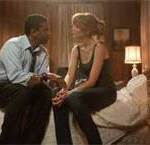Denzel Washington, Flight and ‘New Negro Exceptionalism’
 Enter Whip Whitaker. This post-New Negro generation Black american would have felt the burden of positive representation and projection embodied by his father. This burden might have added to an inability to accept his heavy alcohol and drug addiction.
Enter Whip Whitaker. This post-New Negro generation Black american would have felt the burden of positive representation and projection embodied by his father. This burden might have added to an inability to accept his heavy alcohol and drug addiction.He couldn’t accept, let alone announce, his drinking problem, as this would have constituted race treason; Coming out as an alcoholic Black man would be almost backstabbing the image that New Negro Exceptionalism highlights.
In 1904, Voice of the New Negro magazine published an article called The New Negro Man about the essential qualities —both in terms of character and physical features— of the ideal Black Men, along with 7 portraits. This list did not have a category for a successful pilot who also happens to be an alcoholic, drug addict and an absent father/husband.
These portraits were purely positive prototypes, which did not completely fit in with the complex and diverse realities of the black experience on the ground. As a member of a generation that happened to find the New Negro baton on their laps to continue the efforts to self-project a pristine image, Whip might have felt obliged to project only perfection. So, the more he diverted from the positive image packaging of this ideology in his day-to-day reality, the more introverted and self-denying he might have become.
After he leaves the hospital where he is treated for minor injuries caused by the emergency landing, in order to stay away from news reporters’ abuse, Whip hides himself in his father’s old farmhouse that was home to his crop dusting business. It is interesting that Whip goes through most of the film in this place that he’s been trying to sell for years.
This desire to sell the farmhouse stems from a desire to move on from his past. But he actually has not sold it, as he has not moved on yet.It is not in the farmhouse that he faces his demons as the farmhouse is New Negro / Positive Image Projection Territory. Here, he drinks chronically. But he hides it like dirty laundry, instead of facing, humanizing, and challenging his experience.
One night, while he is again heavily drunk in the farmhouse, he watches a home video he shot probably ten years ago where his father is playing football with his son. This is the only time we see Whip, his father and son, three generations all together, within the same scene.
Whip’s positioning here is powerful. He is watching two people on the screen from whom he is disconnected; one by death, the other by lack of responsibility. Whip knows deep down that he couldn’t live up to his father’s expectation of an archetypal black Hercules. He also sadly watches the result of that failure reflected in his lack of relationship with his own son.